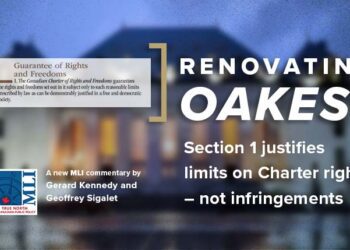I’m completing an e-interview.
First question: “What do the words Canada and Canadian mean to you?”
I type: “Canada has been my home for seventy-five years. I love it.” Then recalling my scholarly obligations, I add: “Canada is a federation governed by liberal democratic institutions.”
I’ve neglected to say anything about the word “Canadian.” But I get a chance with the next question: “Are there uniquely Canadian traits and/or contributions to the world?”
Canadian traits. That’s difficult.
I think about “contributions.” Basketball? Farley Mowat? The Canadarm? I write: “We have one of the world’s oldest political constitutions. Ours is the first constitution to combine British parliamentary institutions with a version of the federalism invented by the U.S. I can’t say with confidence that recent regimes have copied the Canadian formula directly; it might be better simply to note that many free nations have found their way to it.”
Next. “What are you most proud of, and most embarrassed about, respectively, as a Canadian? Please explain why in each instance. Feel free to offer people as examples of those who make you feel either way, i.e., people who embody the best or worst the country has to offer.” (“Please explain.” Do you remember how your stomach used to cramp when you came across that phrase on exams?)
It’s time to come out with the flag flying. I write: “I am not embarrassed about any aspect of Canadian history or culture. There have been regrettable incidents, but comparatively few. (Nothing humans do or make is without flaw.) Confederation did not begin in war. We have had riots and violent police actions, but only some. We have not experienced a civil war. Relations with the conquered province of Quebec have been strained at times and the possibility remains that Quebec will someday leave Canada to build a separate, allied nation. There will never be a war between Canada and Quebec. Most political leaders in Quebec from early days embraced the British constitutional tradition. Some of our best constitutionalists are from that province. Last year the City of Quebec celebrated its 400th anniversary – four hundred years as a French-speaking city on the North America continent! We win our wars. Our forces served with extraordinary distinction in the World Wars. People from every continent come here to make a life for themselves and their children. People who once waged war on Canada (Germans, for example, and Americans) have made a good life here.”
I add: “There are women and men of distinction in our history, but I cannot say that our celebrated Canadians exemplify the “best the country as to offer” in a cultural sense. Canada is defined not by its culture, or by the traits of its citizens, but by its laws and political institutions.”
Done. I press send.
Immediately, there’s a cool breeze from the West. A message from Barry Cooper in Calgary? Oh heck! I’ve made the classic Easterner’s mistake. I’ve spoken of Canada as if the defining characteristics of our political life were established before the West was settled.




